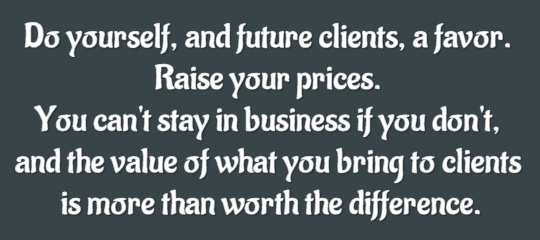It’s the question I’m asked by newbies more frequently than any other:
How much can I charge? (BTW – what they really mean is – How much can I make?)
To answer those questions in 2014, I posed these questions:
- What is it worth to find someone who can provide quality to a life that has little or no quality because of health problems?
- What is it worth to find someone who can save you tens of thousands of dollars, or to prevent you from going bankrupt?
- What is it worth to find someone who can alleviate your fear and provide peace of mind?
The answers were straightforward:
On the high end, it’s worth about $350 an hour.
But on the low end, every day, many of you behave as if it’s worth is $0. Nothing. Zero. Nada. Zip.
I went on to chastise those who are selling themselves and our profession short by not charging enough, and to tell them that they WILL go out of business. They cannot survive in practice without charging enough.
[OK – please pause here and read the cited post: You’re Not Charging Enough and It’s Hurting Our Entire Profession? ]
None of that has changed. But now, these more-than-two-years-later, I have a different point of view for you to consider. With the advent of a new year, it’s an easy time, and a logical time to raise your rates! And that’s today’s overall message.
We’ll begin with a story.
Having just moved into a new house, my husband and I have discovered that we get almost no cell reception. Someone calls, but our phones don’t ring. We try to place a call, and the call goes nowhere. We have one tiny “bar”, or we have that circle with the line through it (no coverage at all.) Very frustrating. Touching base with neighbors we learn that many of them have the same trouble. It turns out the problem is related to the way these homes are built; the materials used (which are chosen for their ability to withstand Florida hurricanes) interfere with cell reception no matter which carrier provides cell service.
So – now what? How do we fix this?
You guessed it – we have to spend money to fix something we never expected would need repair. We’re thrown into a system (cell systems, towers, and building codes) that we know little or nothing about. It’s dangerous not to have what we need (what if there’s a family emergency?) but we barely know where to begin. The system itself (our cell company) makes very expensive recommendations that benefit them – but will they benefit us? Further exacerbating the problem is that hubby uses an iPhone and I use an Android…. So what are we supposed to do?
Our situation is a good metaphor for healthcare advocacy. Not nearly so grave, of course, but what we need is a cell service advocate! Since there doesn’t seem to be anyone listed in AdvoConnection to help us 
It turns out there are two remedies that will reportedly work well for us. Both are very expensive. Both have pros and cons. One solution is to purchase a booster that will allow our phones to work anywhere in our home. The other solution is to upgrade our phones (both phones are 3+ years old) which allows us both to use “wifi calling” meaning, we can jump onto any wifi system for phone calls, including our home wifi. There are a handful of additional benefits to upgrading the phones, of course. But new phones will cost almost twice as much.
In addition, for each solution there are many options. There are dozens of boosters available ranging from $1 (a little plastic antenna that simply sticks to the battery of your phone) to $800. There are also dozens of upgrade phones ranging from $350 to $800.
Now, I don’t know any more about finding the right solution for this problem than most patients and caregivers know about choosing an advocate. So how do I decide among the options that cost $ vs those that cost $$$$$?
In the world of tech devices, I can find plenty of online ratings from professionals and individual users. So I begin with my distrust of the very inexpensive solutions. Instead I will choose something highly rated that is priced in the middle.
Which is precisely how a patient or caregiver will go about choosing an advocate. They will call and ask about your pricing*. They won’t trust you can do the work if you are priced too low. They will look for ratings (available only in the AdvoConnection Directory – through testimonials.) And then, if there is more than one choice, and without a personal reference from a friend, they will choose either the more expensive of two, or the middle-costed advocate among more than two.
Meaning – that if you aren’t charging enough, then you won’t be hired.
So – how do you price your services? How can you be sure you are charging enough, but not too much or too little?
There is no single answer because there are too many variables: your experience, your services, your geographic location, your niche, and others. But there are resources to help you assess the right answer:
- Chapter 8 in The Health Advocate’s Start and Grow Your Own Practice Handbook provides a formula for figuring it out.
- Several APHA Expert Call-ins on Money and Pricing provide you with guidelines for pricing your advocacy services.

Do yourself, and future clients, a favor. Raise your prices. You can’t stay in business if you don’t, and the value of what you bring to clients is more than worth the difference.
*One of THE cardinal rules of being in the advocacy business is to never quote your hourly rate in isolation. Learn more in The Health Advocate’s Start and Grow Your Own Practice Handbook.
LEARN ABOUT APHA MEMBERSHIP | FIND MORE REASONS PATIENTS NEED ADVOCATES






Trisha, I could not agree more! When I first started by business in the Chicago area, I priced myself at a middle of the road, average national price. Many of my referral partners are attorneys and they completely get our business model and value of our services as we prevent medical error. A good friend of mine, and attorney said to me one day, “Teri, why are you charging so little? People will think you are not very good!” And to some extent that is true. The first thing we must do is have confidence in our own abilities and expertise and price accurately for our experience and areas of expertise. People value and respect you more if you price a little higher. It was scary at first to almost double my hourly rate but I actually got MORE business when I did so…!